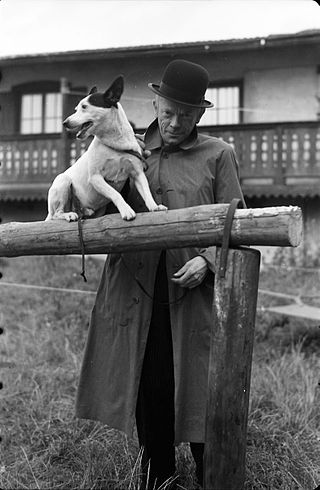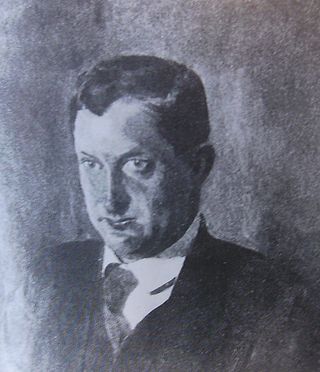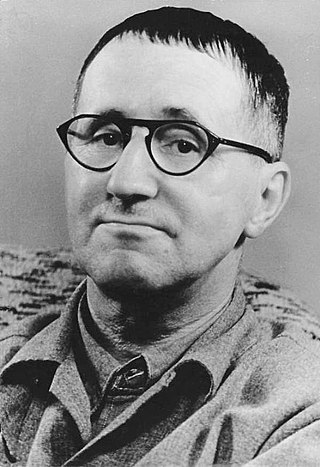Related Research Articles
The Resistible Rise of Arturo Ui, subtitled "A parable play", is a 1941 play by the German playwright Bertolt Brecht. It chronicles the rise of Arturo Ui, a fictional 1930s Chicago mobster, and his attempts to control the cauliflower racket by ruthlessly disposing of the opposition. The play is a satirical allegory of the rise of Adolf Hitler and the Nazi Party in Germany prior to World War II.

Life of Galileo, also known as Galileo, is a play by the 20th century German dramatist Bertolt Brecht and collaborator Margarete Steffin with incidental music by Hanns Eisler. The play was written in 1938 and received its first theatrical production at the Zurich Schauspielhaus, opening on the 9th of September 1943. This production was directed by Leonard Steckel, with set-design by Teo Otto. The cast included Steckel himself, Karl Paryla and Wolfgang Langhoff.

Mother Courage and Her Children is a play written in 1939 by the German dramatist and poet Bertolt Brecht (1898–1956), with significant contributions from Margarete Steffin. Four theatrical productions were produced in Switzerland and Germany from 1941 to 1952, the last three supervised and/or directed by Brecht, who had returned to East Germany from the United States.

Baal was the first full-length play written by the German modernist playwright Bertolt Brecht. It concerns a wastrel youth who becomes involved in several sexual affairs and at least one murder. It was written in 1918, when Brecht was a 20-year-old student at Munich University, in response to the expressionist drama The Loner by the soon-to-become-Nazi dramatist Hanns Johst.

Drums in the Night is a play by the German playwright Bertolt Brecht. Brecht wrote it between 1919 and 1920, and it received its first theatrical production in 1922. It is in the Expressionist style of Ernst Toller and Georg Kaiser. The play—along with Baal and In the Jungle—won the Kleist Prize for 1922 ; the play was performed all over Germany as a result. Brecht later claimed that he had only written it as a source of income.

Karl Valentin was a Bavarian comedian. He had significant influence on German Weimar culture. Valentin starred in many silent films in the 1920s, and was sometimes called the "Charlie Chaplin of Germany". His work has an essential influence on artists like Bertolt Brecht, Samuel Beckett, Loriot and Helge Schneider.

Arthur Kutscher was a German historian of literature and researcher in drama. Together with Max Herrmann he can be seen as a founding father of theatre studies in Germany. He was a professor at Munich University, where he taught a famous seminar in theatre history. Kutscher was a friend of the iconoclastic dramatist and cabaret-star Frank Wedekind. His work influenced many playwrights, poets, and directors. His students included Bertolt Brecht, Erwin Piscator, Peter Hacks, Hanns Johst, Klabund, and Erich Mühsam. Brecht's first full-length play, Baal, was written in response to an argument in one of Kutscher's drama seminars. While Kutscher was responsible for inspiring an admiration for Wedekind in the young Brecht, he was "bitterly critical" of Brecht's own early dramatic writings.

The Recruiting Officer is a 1706 play by the Irish writer George Farquhar, which follows the social and sexual exploits of two officers, the womanising Plume and the cowardly Brazen, in the town of Shrewsbury to recruit soldiers. The characters of the play are generally stock, in keeping with the genre of Restoration comedy.
Man Equals Man, or A Man's a Man, is a play by the German modernist playwright Bertolt Brecht. One of Brecht's earlier works, it explores themes of war, human fungibility, and identity. One of the agitprop works inspired by the developments in USSR praising the bolshevik collectivism and replaceability of each member of the collective.
Mr Puntila and His Man Matti is an epic comedy by the German modernist playwright Bertolt Brecht. It was written in 1940 and first performed in 1948.
In the Jungle of Cities is a play by the German modernist playwright Bertolt Brecht. Written between 1921 and 1924, it received its first theatrical production under the title Im Dickicht at the Residenztheater in Munich, opening on 9 May 1923. This production was directed by Erich Engel, with set design by Caspar Neher. The cast included Otto Wernicke as Shlink the lumber dealer, Erwin Faber as George Garga, and Maria Koppenhöfer as his sister Mary. Im Dickicht was produced at Max Reinhardt's Deutsches Theater in Berlin, where Brecht had been employed as a dramaturg. The production opened on 29 October 1924, with the same director and scenographer, but in a cut version with a new prologue and the title Dickicht: Untergang einer Familie. Fritz Kortner played Shlink and Walter Frank played George, with Franziska Kinz, Paul Bildt, Mathias Wieman, and Gerda Müller also in the cast. Willett and Manheim report that this production "was not a success".
Round Heads and Pointed Heads is an epic parable play written by the German dramatist Bertolt Brecht, in collaboration with Margarete Steffin, Emil Burri, Elisabeth Hauptmann, and the composer Hanns Eisler. The play's subtitle is Money Calls to Money and its authors describe it as "a tale of horror." The play is a satirical anti-Nazi parable about a fictitious country called Yahoo in which the rulers maintain their control by setting the people with round heads against those with pointed heads, thereby substituting racial relations for their antagonistic class relations. The play is composed of 11 scenes in prose and blank verse and 13 songs. Unlike another of Brecht's plays from this period, The Mother, Round Heads and Pointed Heads was addressed to a wide audience, Brecht suggested, and took account of "purely entertainment considerations." Brecht's notes on the play, written in 1936, contain the earliest theoretical application of his "defamiliarization" principle to his own "non-Aristotelian" drama.

The Life of Edward II of England, also known as Edward II, is an adaptation by the German modernist playwright Bertolt Brecht of the 16th-century historical tragedy by Marlowe, The Troublesome Reign and Lamentable Death of Edward the Second, King of England, with the Tragical Fall of Proud Mortimer (c.1592). The play is set in England between 1307 and 1326. A prefatory note to the play reads:
Driving Out a Devil is an early one-act farce by the 20th-century German dramatist Bertolt Brecht. It was written in prose, probably in 1919, and was first published in volume 13 of Brecht's Stücke. The play charts the attempts of a self-confident and manipulative Bavarian peasant boy to outwit the vigilant parents of a girl of his village. Ronald Hayman suggests that this play dramatises most clearly Brecht's own ability to influence people.

Mahagonny, ein Songspiel, or Mahagonny, a song-play, was written by composer Kurt Weill and dramatist Bertolt Brecht and first performed with that title and description in 1927. Elisabeth Hauptmann contributed the words to two of its songs. Just under half an hour in length, the work can be thought of as a staged or scenic cantata. By the end of 1929, however, Mahagonny had grown into a two-hour opera with the title Aufstieg und Fall der Stadt Mahagonny, or Rise and Fall of the City of Mahagonny. This was premiered in March 1930. Today the cantata and the opera are considered separately, the latter holding a place in the repertory, the former being an occasional piece staged in small theaters or programmed as an outgrowth of a song recital when resources permit. For this reason the shorter work is informally referred to as Das kleine Mahagonny, or The Little Mahagonny, or as Mahagonny-Songspiel.
Coriolanus is an unfinished German adaptation by the modernist playwright Bertolt Brecht of the English 17th-century tragedy of the same name by William Shakespeare. Brecht wrote it sometime between 1951 and 1953. This adaptation reveals the influence of Mao Zedong on Brecht's social thought especially the idea of primary and secondary contradictions which Mao discussed in his treatise On Contradiction. Brecht alluded to this text and discusses his development on the original and his ideas for its staging in an essay entitled "Study of the First Scene of Shakespeare's Coriolanus", which is written in the form of a dialogue with his collaborators at the Berliner Ensemble theatre company. The play was first staged by Heinrich Koch at the Frankfurt Schauspielhaus theatre, where it opened on 22 September 1962. It was later staged by the Berliner Ensemble in September 1964. Ruth Berghaus became famous for her staging of the battle scenes in this production. The play was published in an English translation by Ralph Manheim in volume nine of Brecht's Collected Plays.
The Trial of Joan of Arc at Rouen, 1431 is an adaptation by the German dramatist Bertolt Brecht of a radio play by Anna Seghers. It was written in collaboration with Benno Besson and premiered at the Berliner Ensemble in November 1952, in a production directed by Besson, with Käthe Reichel as Joan.
Arnolt Bronnen was an Austrian playwright and director.
The Good Person of Szechwan is a play written by the German dramatist Bertolt Brecht, in collaboration with Margarete Steffin and Ruth Berlau. The play was begun in 1938 but not completed until 1941, while the author was in exile in the United States. It was first performed in 1943 at the Zürich Schauspielhaus in Switzerland, with a musical score and songs by Swiss composer Huldreich Georg Früh. Today, Paul Dessau's composition of the songs from 1947 to 1948, also authorized by Brecht, is the better-known version. The play is an example of Brecht's "non-Aristotelian drama", a dramatic form intended to be staged with the methods of epic theatre. The play is a parable set in the Chinese "city of Sichuan".

Eugen Berthold Friedrich Brecht, known professionally as Bertolt Brecht, was a German theatre practitioner, playwright, and poet. Coming of age during the Weimar Republic, he had his first successes as a playwright in Munich and moved to Berlin in 1924, where he wrote The Threepenny Opera with Kurt Weill and began a life-long collaboration with the composer Hanns Eisler. Immersed in Marxist thought during this period, he wrote didactic Lehrstücke and became a leading theoretician of epic theatre and the Verfremdungseffekt.